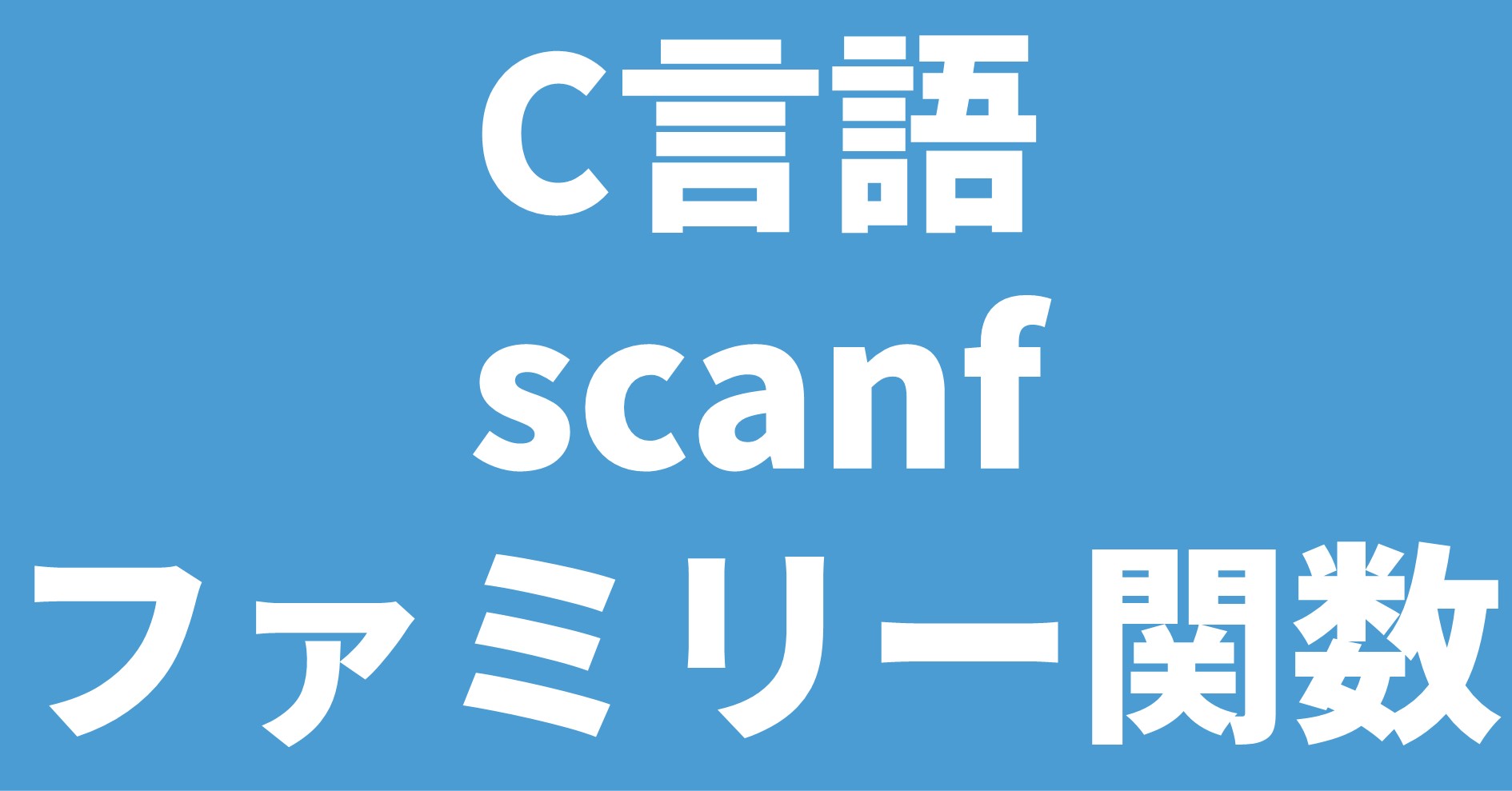
C言語でscanf関数の自作を教えて!
こういった悩みにお答えします.
本記事の信頼性
- リアルタイムシステムの研究歴12年.
- 東大教員の時に,英語でOS(Linuxカーネル)の授業.
- 2012年9月~2013年8月にアメリカのノースカロライナ大学チャペルヒル校(UNC)コンピュータサイエンス学部で客員研究員として勤務.C言語でリアルタイムLinuxの研究開発.
- プログラミング歴15年以上,習得している言語: C/C++,Python,Solidity/Vyper,Java,Ruby,Go,Rust,D,HTML/CSS/JS/PHP,MATLAB,Verse(UEFN), Assembler (x64,aarch64).
- 東大教員の時に,C++言語で開発した「LLVMコンパイラの拡張」,C言語で開発した独自のリアルタイムOS「Mcube Kernel」をGitHubにオープンソースとして公開.
- 2020年1月~現在はアメリカのノースカロライナ州チャペルヒルにあるGuarantee Happiness LLCのCTOとしてECサイト開発やWeb/SNSマーケティングの業務.2022年6月~現在はアメリカのノースカロライナ州チャペルヒルにあるJapanese Tar Heel, Inc.のCEO兼CTO.
- 最近は自然言語処理AIとイーサリアムに関する有益な情報発信や,Unreal Editor for Fortnite(UEFN)でゲーム開発に従事.
- (AI全般を含む)自然言語処理AIの論文の日本語訳や,AIチャットボット(ChatGPT,Auto-GPT,Gemini(旧Bard)など)の記事を50本以上執筆.アメリカのサンフランシスコ(広義のシリコンバレー)の会社でChatGPT/Geminiを訓練するプロンプトエンジニア・マネージャー・Quality Assurance(QA)の業務委託の経験あり.
- (スマートコントラクトのプログラミングを含む)イーサリアムや仮想通貨全般の記事を200本以上執筆.イギリスのロンドンの会社で仮想通貨の英語の記事を日本語に翻訳する業務委託の経験あり.
- UEFNで10本以上のゲームを開発し,フォートナイト上で公開(Fortnite,Fortnite.GG).
こういった私から学べます.
C言語を独学で習得することは難しいです.
私にC言語の無料相談をしたいあなたは,公式LINE「ChishiroのC言語」の友だち追加をお願い致します.
私のキャパシティもあり,一定数に達したら終了しますので,今すぐ追加しましょう!
独学が難しいあなたは,元東大教員がおすすめするC言語を学べるオンラインプログラミングスクール5社で自分に合うスクールを見つけましょう.後悔はさせません!
目次
C言語でscanf関数の自作「myscanf関数」
C言語でscanf関数の自作「myscanf関数」を紹介します.
scanf関数の内部構造がわかると,C言語の理解が深まり,コンピュータの本質が見えてきます.
scanf関数の自作「myscanf関数」の作成ルール
scanf関数の自作「myscanf関数」の作成ルールは以下になります.
- 標準ライブラリのscanfファミリー関数(scanf/fscanf/sscanf/vscanf/vsscanf/vfscanf関数)は利用不可
- 文字の入力には標準ライブラリのfgetc関数のみを利用
scanfファミリー関数を知りたいあなたはこちらからどうぞ.
また,myscanf関数はscanf関数の主な機能を実装しています.
scanf関数の全ての機能を実装しているわけではないことに注意して下さい.
myscanf関数の自作コード
myscanf関数の自作コードを紹介します.
主な関数は以下になります.
- parse_arg関数:フォーマット指定子の解析
- get_val関数:入力したデータを文字列として取得
- myvfscanf関数:myscanf関数から引数を受け取ってフォーマット指定子の解析と入力変換
- myscanf関数:scanf関数の自作コードの呼び出し
- scan_test*関数:myscanf関数のテストプログラム
- main関数:scan_test*関数の呼び出し
ここで,「*」はワイルドカードを表します.
myscanf関数の自作コードは以下になります.
|
1 2 3 4 5 6 7 8 9 10 11 12 13 14 15 16 17 18 19 20 21 22 23 24 25 26 27 28 29 30 31 32 33 34 35 36 37 38 39 40 41 42 43 44 45 46 47 48 49 50 51 52 53 54 55 56 57 58 59 60 61 62 63 64 65 66 67 68 69 70 71 72 73 74 75 76 77 78 79 80 81 82 83 84 85 86 87 88 89 90 91 92 93 94 95 96 97 98 99 100 101 102 103 104 105 106 107 108 109 110 111 112 113 114 115 116 117 118 119 120 121 122 123 124 125 126 127 128 129 130 131 132 133 134 135 136 137 138 139 140 141 142 143 144 145 146 147 148 149 150 151 152 153 154 155 156 157 158 159 160 161 162 163 164 165 166 167 168 169 170 171 172 173 174 175 176 177 178 179 180 181 182 183 184 185 186 187 188 189 190 191 192 193 194 195 196 197 198 199 200 201 202 203 204 205 206 207 208 209 210 211 212 213 214 215 216 217 218 219 220 221 222 223 224 225 226 227 228 229 230 231 232 233 234 235 236 237 238 239 240 241 242 243 244 245 246 247 248 249 250 251 252 253 254 255 256 257 258 259 260 261 262 263 264 265 266 267 268 269 270 271 272 273 274 275 276 277 278 279 280 281 282 283 284 285 286 287 |
/* * Author: Hiroyuki Chishiro * License: 2-Clause BSD */ #include <stdio.h> #include <stdlib.h> #include <string.h> #include <stdarg.h> #include <stdbool.h> #include <ctype.h> #include <assert.h> #define BUFSIZE 1024 #define INIT_DIGIT -1 #define INIT_FLOAT_DIGIT 6 enum format_arglen { INT = 0, LONG, }; enum format_argtype { NONE = 0, SIGNED, UNSIGNED, FLOAT, STRING, CHAR, PERCENT, }; enum format_pad { PAD_NO = 0, PAD_BLANK, PAD_ZERO, }; struct format_argdesc { int radix; enum format_arglen len; enum format_argtype type; }; char sbuf[BUFSIZE]; const char *parse_arg(const char *fmt, struct format_argdesc *desc) { bool complete; assert(*fmt == '%'); complete = false; desc->len = INT; desc->type = NONE; desc->radix = 10; while (*++fmt) { switch (*fmt) { case 'l': desc->len = LONG; break; case 'd': desc->type = SIGNED; complete = true; goto out; case 'u': desc->type = UNSIGNED; complete = true; goto out; case 'x': desc->type = UNSIGNED; desc->radix = 16; complete = true; goto out; case 'f': desc->type = FLOAT; complete = true; goto out; case 's': desc->type = STRING; complete = true; goto out; case 'c': desc->type = CHAR; complete = true; goto out; case '%': desc->type = PERCENT; complete = true; goto out; default: fprintf(stderr, "Unknown mark: %d\n", *fmt); desc->type = NONE; complete = true; goto out; } } out: if (!complete) { assert("Unknown/incomplete expression"); } /* Bypass last expression char */ if (*fmt != '\0') { fmt++; } return fmt; } int get_val(char *dst, FILE *fp) { int i = 0; int c; while (isspace(c = fgetc(fp))) { } ungetc(c, fp); while (!isspace(c = fgetc(fp)) && i < BUFSIZE) { dst[i++] = c; } ungetc(c, fp); dst[i] = '\0'; return i; } int myvfscanf(FILE *fp, const char *fmt, va_list args) { struct format_argdesc desc = {0}; int num = 0; int len; int c; while (*fmt) { while (isspace((unsigned char) *fmt)) { fmt++; } while (isspace(c = fgetc(fp))) { } ungetc(c, fp); while (*fmt && *fmt != '%' && !isspace(*fmt)) { if (*fmt++ != fgetc(fp)) { return num; } } if (*fmt != '%') { continue; } len = 0; assert(*fmt == '%'); fmt = parse_arg(fmt, &desc); switch (desc.type) { case SIGNED: len += get_val(sbuf, fp); num++; if (desc.len == LONG) { *va_arg(args, long *) = strtol(sbuf, NULL, desc.radix); } else { *va_arg(args, int *) = strtol(sbuf, NULL, desc.radix); } break; case UNSIGNED: len += get_val(sbuf, fp); num++; if (desc.len == LONG) { *va_arg(args, unsigned long *) = strtoul(sbuf, NULL, desc.radix); } else { *va_arg(args, unsigned int *) = strtoul(sbuf, NULL, desc.radix); } break; case FLOAT: len += get_val(sbuf, fp); num++; if (desc.len == LONG) { *va_arg(args, double *) = strtod(sbuf, NULL); } else { *va_arg(args, float *) = strtod(sbuf, NULL); } break; case STRING: len += get_val(va_arg(args, char *), fp); num++; break; case CHAR: len += get_val(sbuf, fp); num++; *va_arg(args, char *) = *sbuf; break; default: fprintf(stderr, "Error: Unknown scan type %d\n", desc.type); break; } } return num; } int myscanf(const char *fmt, ...) { va_list args; int n; va_start(args, fmt); n = myvfscanf(stdin, fmt, args); va_end(args); return n; } void scan_test_int(void) { int i, j; printf("Please input an integer: "); myscanf("%d", &i); printf("i = %d\n", i); printf("Please input two integers: "); myscanf("%d%d", &i, &j); printf("i = %d, j = %d\n", i, j); } void scan_test_hex(void) { int x; printf("Please input a hex integer: "); myscanf("%x", &x); printf("x = 0x%x\n", x); } void scan_test_string(void) { char s[BUFSIZE]; printf("Please input a string: "); myscanf("%s", s); printf("s = %s\n", s); } void scan_test_float(void) { double d; printf("Please input a floating point: "); myscanf("%lf", &d); printf("d = %lf\n", d); } int main(void) { scan_test_int(); scan_test_hex(); scan_test_string(); scan_test_float(); return 0; } |
実行結果は以下になります.
ここで,「Please ...: 」の後の文字は入力文字です.
|
1 2 3 4 5 6 7 8 9 10 11 12 |
$ gcc myscanf.c $ a.out Please input an integer: 1 i = 1 Please input two integers: 1 2 i = 1, j = 2 Please input a hex integer: b x = 0xb Please input a string: abrb s = abrb Please input a floating point: 4.665 d = 4.665000 |
parse_arg関数ではgoto文を利用していますが,goto文が有用な3つの例外の1つとして詳しく書かれています.
まとめ
C言語でscanf関数の自作「myscanf関数」を紹介しました.
myscanf関数は複雑ですので,何度も読み直すことをおすすめします.
C言語の理解が深まり,コンピュータの本質が理解できるようになります.
printf関数の自作「myprintf関数」も学べます.
C言語を独学で習得することは難しいです.
私にC言語の無料相談をしたいあなたは,公式LINE「ChishiroのC言語」の友だち追加をお願い致します.
私のキャパシティもあり,一定数に達したら終了しますので,今すぐ追加しましょう!
独学が難しいあなたは,元東大教員がおすすめするC言語を学べるオンラインプログラミングスクール5社で自分に合うスクールを見つけましょう.後悔はさせません!



